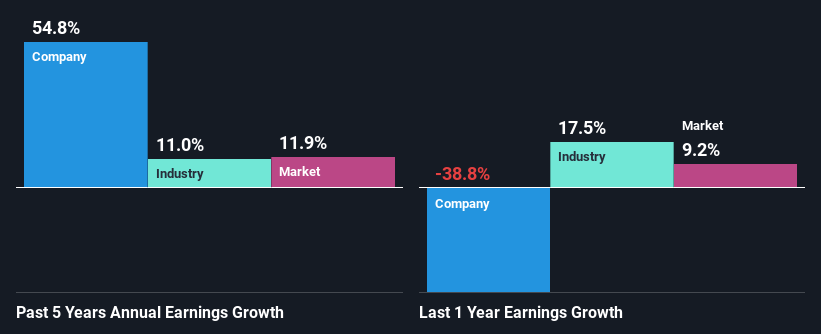Stock Analysis
- Saudi Arabia
- /
- Real Estate
- /
- SASE:4020
Has Saudi Real Estate Company's (TADAWUL:4020) Impressive Stock Performance Got Anything to Do With Its Fundamentals?

Most readers would already be aware that Saudi Real Estate's (TADAWUL:4020) stock increased significantly by 21% over the past three months. We wonder if and what role the company's financials play in that price change as a company's long-term fundamentals usually dictate market outcomes. Specifically, we decided to study Saudi Real Estate's ROE in this article.
ROE or return on equity is a useful tool to assess how effectively a company can generate returns on the investment it received from its shareholders. Simply put, it is used to assess the profitability of a company in relation to its equity capital.
View our latest analysis for Saudi Real Estate
How Do You Calculate Return On Equity?
The formula for ROE is:
Return on Equity = Net Profit (from continuing operations) ÷ Shareholders' Equity
So, based on the above formula, the ROE for Saudi Real Estate is:
2.6% = ر.س129m ÷ ر.س4.9b (Based on the trailing twelve months to December 2023).
The 'return' is the yearly profit. One way to conceptualize this is that for each SAR1 of shareholders' capital it has, the company made SAR0.03 in profit.
What Is The Relationship Between ROE And Earnings Growth?
So far, we've learned that ROE is a measure of a company's profitability. We now need to evaluate how much profit the company reinvests or "retains" for future growth which then gives us an idea about the growth potential of the company. Generally speaking, other things being equal, firms with a high return on equity and profit retention, have a higher growth rate than firms that don’t share these attributes.
Saudi Real Estate's Earnings Growth And 2.6% ROE
As you can see, Saudi Real Estate's ROE looks pretty weak. Not just that, even compared to the industry average of 7.6%, the company's ROE is entirely unremarkable. In spite of this, Saudi Real Estate was able to grow its net income considerably, at a rate of 55% in the last five years. We reckon that there could be other factors at play here. For example, it is possible that the company's management has made some good strategic decisions, or that the company has a low payout ratio.
Next, on comparing with the industry net income growth, we found that Saudi Real Estate's growth is quite high when compared to the industry average growth of 11% in the same period, which is great to see.

The basis for attaching value to a company is, to a great extent, tied to its earnings growth. It’s important for an investor to know whether the market has priced in the company's expected earnings growth (or decline). This then helps them determine if the stock is placed for a bright or bleak future. One good indicator of expected earnings growth is the P/E ratio which determines the price the market is willing to pay for a stock based on its earnings prospects. So, you may want to check if Saudi Real Estate is trading on a high P/E or a low P/E, relative to its industry.
Is Saudi Real Estate Efficiently Re-investing Its Profits?
Saudi Real Estate doesn't pay any regular dividends currently which essentially means that it has been reinvesting all of its profits into the business. This definitely contributes to the high earnings growth number that we discussed above.
Conclusion
In total, it does look like Saudi Real Estate has some positive aspects to its business. With a high rate of reinvestment, albeit at a low ROE, the company has managed to see a considerable growth in its earnings. While we won't completely dismiss the company, what we would do, is try to ascertain how risky the business is to make a more informed decision around the company. Our risks dashboard would have the 2 risks we have identified for Saudi Real Estate.
Valuation is complex, but we're helping make it simple.
Find out whether Saudi Real Estate is potentially over or undervalued by checking out our comprehensive analysis, which includes fair value estimates, risks and warnings, dividends, insider transactions and financial health.
View the Free AnalysisHave feedback on this article? Concerned about the content? Get in touch with us directly. Alternatively, email editorial-team (at) simplywallst.com.
This article by Simply Wall St is general in nature. We provide commentary based on historical data and analyst forecasts only using an unbiased methodology and our articles are not intended to be financial advice. It does not constitute a recommendation to buy or sell any stock, and does not take account of your objectives, or your financial situation. We aim to bring you long-term focused analysis driven by fundamental data. Note that our analysis may not factor in the latest price-sensitive company announcements or qualitative material. Simply Wall St has no position in any stocks mentioned.
About SASE:4020
Saudi Real Estate
Saudi Real Estate Company, together with its subsidiaries, operates as a real estate development company in Saudi Arabia.
Limited growth with questionable track record.

